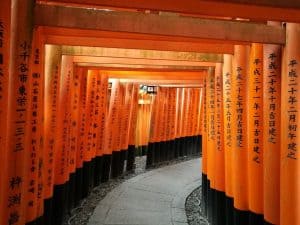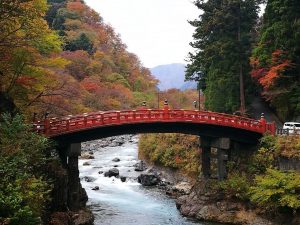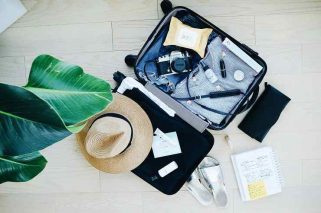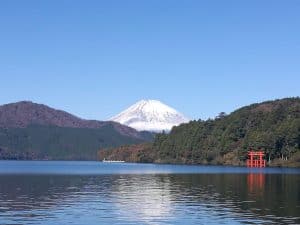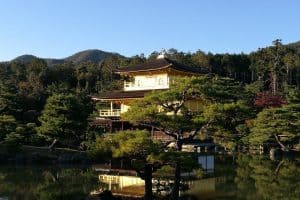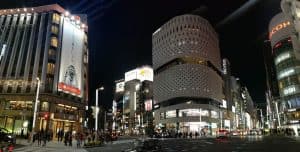While we were planning our trip to Japan, we found ourselves reading plenty of “things to know before traveling to Japan for the first time” type of posts. And boy, did we read some interesting facts! Some things we encountered quite often, like the most important etiquette rules to follow, but other myths about Japan have stuck in my head as well.
Yes, it’s true guys, there might be affiliate links in this awesome, free post. This means that if you decide to buy something that you find here, and you use one of my links to do so, I will earn a small commission at no extra cost to you. I plan to use the money to buy ice cream and to travel more so I can write these useful guides for you. As an Amazon Associate, I earn from qualifying purchases.
We also read Japan itinerary ideas, budget guides for Japan, how to use public transportation in Japan, and plenty of other stuff. But the “in Japan, they do this” or “while in Japan, you should expect that” were the most prevalent types of posts I could find.
So I decided to write this post after our trip there and I plan to open up about all this information one can find online or our personal beliefs we tend to hold on to. In the end, this is why we travel, right? To open up to a new culture every time we set foot in a new country.
Want to have a helpful resource to make your planning efforts not only easier but also more enjoyable? Check out my Japan Travel Guide from the shop!

Table of Contents
1. Is Japan very expensive?
Well, it can be. It mostly depends on what you plan to do. If you want to stay at a 5* hotel and eat in high-class restaurants every day, of course, it’ll be expensive. If you stay in budget or mid-range hotels eat in small family-owned restaurants and have a few snacks from grocery stores, it can be pretty affordable.
What’s usually more expensive is to be paid before you get there. Airfare can be expensive (although you can spot some good deals from time to time) and accommodation as well. But eating and visiting stuff is not as expensive as it is in other countries (Switzerland, Norway and the UK being a few examples).
If you need more help with budget planning, I have prepared a few resources you can use. Here is a budget guide for a 2 week trip to Japan and right below you can download a free PDF with entry fees to Japanese tourist places you might need for your trip.
The form you have selected does not exist.
2. Do I need to know Japanese to visit Japan?
Not necessarily. Most people have at least a basic level of English, and this is already quite impressive, as English is probably not an easy language for them. The Japanese language has 3 alphabets, and learning English means that they would have to learn a fourth. Not easy, to be frank.
If you plan to visit most of the well-known areas, like Tokyo, Kyoto, and Osaka, you’ll manage just fine. There are plenty of directions written in English and/or using Latin characters, so it’s not that hard. Also, I hope you plan to have Wi-Fi all the time, as Google Maps will be your best friend while you’re there.
3. What’s the proper etiquette in Japan for tourists?
This is mostly based on the assumption that locals will get offended if you don’t respect their norms and manners, which is not true. It’s nice to read a few rules before traveling to Japan, like how you should use your chopsticks and how to properly enter a shrine, but don’t expect to learn everything they do.
The people are very forgiving of foreigners and they understand you are not a local. Even if you don’t know any particular rules, you should be OK if you’re following the basics: observe what the locals are doing, listen to instructions if you are given any, be polite to people, and apologize if you’re in the wrong.
If you’re planning to visit an onsen in Japan, something that you should absolutely add to your itinerary, check out my detailed guide about it, and you’ll learn all the etiquette rules that apply here as well.
4. Are Japanese people polite?
Yes, they are, especially with tourists. It’s part of their culture to be nice and helpful to guests. And they often go the extra mile to help you out when you seem lost, even before you decide to ask for help. And even if they don’t speak English, they will try to help you out in one way or another.
I have a personal example. We were in Kyoto, trying to get to Tokyo, and wanted to cancel our ICoca card before leaving, to get our deposit back. We thought it would be a good idea to split, so my husband went with the luggage on the train platform and I had the job of finding a way to get our money back.
I went to a man from the ticket office, and he went through quite a few stages of helping me. I think he understood different things from what I explained, so he verified my card, and then he took me to a machine to show me my credit. At one point he realized I wanted to cancel, so he closed his shack, took me by the hand, and took me to the tourist office that was 30ft (10 meters) further.
There, he explained what he thought I needed to a lady, and she asked me if that was the case. He did understand what I needed, but couldn’t help me. He just spent 20 minutes out of his work schedule to cater to my needs and he wanted to be sure I get the help I need. Now, if this is not a nice man, I don’t know who is.
5. Do Japanese people follow the rules blindly?
Mostly yes. But not always. It’s still not clear to me where were the bikers supposed to bike, as I could see them everywhere: on the streets, on the sidewalks, and crossing streets while riding the bike. Maybe those are the rules, who knows? We have also seen plenty of people crossing the street on a red light, so yeah, there are all types of people everywhere in the world.
6. Japanese people don’t talk while on trains at all.
Usually no. Especially when it comes to phone conversations, they don’t do it. It’s frowned upon and you shouldn’t do it either. You’ll hear plenty of announcements about this in any mode of transportation, so don’t worry.
But if they’re in a group, they talk to each other. This is why most people seem to think they never talk. We, as tourists, mostly see people on their way to work, or going by their daily lives. If they’re alone on a bus, they won’t talk, but if they’re in a group, they will. They will use a soft voice anyway, to not disturb other people, which is a very nice gesture.
7. Do people use bowing as a sign of gratitude?
Yes, they still do that. The conductor that goes through a train car will bow to the people in the car, even if they’re sitting backward. And people working in shops will bow slightly to show you their gratitude.
You might find information online that deer in Nara will also bow as gratitude if you give them food. I would advise you not to feed animals anywhere, for multiple ethical reasons. We have fed a baby deer an acorn we found in the forest, and it didn’t bow (but ate it gracefully – yes, I have heart eyes right now). Maybe it was not highly educated enough.
8. Do people sleep on public transportation?
Why yes, they do! I did the same. Their commute can be quite lengthy, and they usually work long hours, so plenty of people use this time to catch up on sleep.
9. Do Japanese people eat sushi all the time?
Nope! Why would they? Japanese cuisine is SO much more than sushi. And Japanese people, like any other people, get bored if they eat the same thing every day. It’s like you would think that Italians eat pizza every day and French people eat croissants all the time. They could, but it doesn’t mean they should.
10. Is Japanese food as amazing as we think?
Well, it depends. I have not encountered anyone who’s not in love with Japanese food. Except for me. I was not so impressed by it. But, in my defense, I’m also a picky eater, so my opinions on food are not to be taken into account.
What I didn’t expect from Japanese food was the amount of deep-fried stuff and eggs. Sometimes deep-fried eggs, for a nice combo. I expected more vegetables and fresh fruit, and I found none of these. But again, maybe it’s just me.
What I can tell for sure is that you’ll find some very interesting mixes in Japan. What looks like a salty snack might turn out to be a sweet one, and something as classic as pizza can be quite different compared to what you know. Try some Okinawan snake wine if you’re really in for a treat!

11. Matcha-flavored stuff is awesome!
Again, I’m a picky eater, but I quite frankly didn’t like my matcha-flavored ice cream. I liked candy and other sweets with this flavor, but I assume it was due to the sugar. Again, you cannot comment on anything about tastes, we are very different in the end.
12. Can you have black ice cream in Japan?
Well, I tried, but I couldn’t get closer than gray. Everyone is showing these amazing black sesame ice cream cones on IG, and I wanted desperately to try one. It tastes good, I have to admit, but it’s not black. In the end, it cannot be, as any ice cream has a milk base that will affect the color as well.
13. Is Tokyo crowded and chaotic?
It depends on where you’re going. Tokyo is the largest city in the world and the crowds here can get pretty intense. But there’s more to this. Firstly, Tokyo is not as chaotic, as anything else in Japan. Law and order is not just an empty phrase here. They wouldn’t be able to manage 37 million inhabitants if it were chaotic.
The second aspect is that it depends on where and when you’re going. If you’re on a train at rush hour, I’m sorry, but you WILL see and feel the crowds. If you’re in the park midday, you’ll probably have the whole park to yourself. This being said, there’s something special in Tokyo’s vibe, and part of it is due to the crowds, you know.
14. Is Cherry blossom season the best time to visit Japan?
Best time for what? For Sakura, of course, it is. But there’s so much more to Japan than nice flowers. My favorite season to visit Japan is in autumn, specifically November. Another good time is also in May, right after Sakura. You’ll have nice weather and fewer crowds. In a nutshell, the best time to visit Japan is NOW!
15. Is there free Wi-fi everywhere in Japan?
Not as much as one would think, considering how modern is Japan in everything else. You have the obvious options at McDonald’s and Starbucks, but the speed is probably not what you need for social media and other intensive consumers. Plan to have your wi-fi while in Japan, as you’ll need it. Check out my post about ways to get internet while in Japan for more ideas.
16. Can one pay by credit card in Japan?
Rarely. Another surprising fact about this very modern society is that it’s still highly cash-based. You can pay by card in most stores and restaurants, but you cannot do the same for transportation and most entry fees to tourist places. Our Revolut card worked for most of our needs and we could also get money from ATMs, so I’d say it’s a good investment to have. Check out my detailed post about it here.
17. Is Japan modern?
In certain cases, for sure, this is one of the most widespread of all myths about Japan. The two biggest examples are the trains and the toilets. The Robot restaurant and the Digital Art Museum come a close second.
But in other cases, people have stated there’s still SO much paperwork involved in their daily life. Most people still use the fax daily, and this means something in this century. I have never used fax, and I’m not that young either, so I would say this is a good indicator.

18. Can I visit everything in Japan from Tokyo?
Uhm, no. Japan is not as small as you think. It’s slightly larger than Germany, and way more populated. Now, you wouldn’t dream of seeing all of Germany on a day trip from Berlin, would you?
Or, let me put it differently. Japan is around the same size as California. Would you be able to visit Los Angeles on a day trip from San Francisco? Yeah, me neither.
19. Is Japanese precision so good?
Well, I’m writing this from Switzerland, so I’m not allowed to say it is. Joking aside, for most things Japanese precision is a known quality. Punctuality is highly valued in Japan, so trains are rarely late, and when they are, there’s a whole world that tries to mitigate this.
Also, there’s an interesting range of arts that have been based on precision, calligraphy, and precision walking being just two of them. Nothing is perfect in this world, but Japan comes pretty close to it anyway.
20. Is Japan safe to travel?
Definitely! The crime rates in Japan are very low, and we felt safe while there even at nighttime. And considering how much cash they carry, this is almost a miracle. If you lost or forgot your phone or purse somewhere, go to the police or train station office, and you’ll probably find it there, waiting for you, with all of your belongings intact. Again, the amazing Japanese society at its finest.
While the number of violent crimes is low, plenty of women have reported being molested while on public transportation. The traffic at rush hour, unfortunately, leaves plenty of room for such events. That’s why, as a woman, you can always use the ladies’ train car, which is usually the first one on a train and is marked with pink or red.
21. Is Japan dangerous?
A bit, yes. How does that even make sense after the previous question, you ask? Well, the country is known to have a history of earthquakes, tsunamis, typhoons, and flooding. And atomic bombs, but this is not to be repeated ever again! So yes, from this point of view, it can be dangerous.
But if I were to be in a natural disaster in my life, I would like it to be in Japan. Since their history is strongly sprinkled with these types of events, they are highly prepared for anything nature might throw at them. This is a nation of survivors, I tell you.
A brief example, if I may: at Fukushima, there was an earthquake followed by a tsunami and a nuclear accident. All things considered, the number of victims (18.000) is not as high as it would have been if this were to happen anywhere else in the world. Also, this was the largest earthquake in the world in the past 100 years so yes, it could have been way worse.
22. Is Japan clean?
Very! The cleanest place I have ever seen. After coming back from Japan, Switzerland looked dirty (don’t mean to offend anyone). Imagine that it was autumn and we could barely find a leaf on the sidewalk. Like, that level of cleanliness.
People are even cleaner. Everyone looks very clean and groomed. The only people that looked sloppy in Japan were us. You could spot the foreigners from a mile away by this principle only.

23. Geishas are expensive prostitutes, right?
Absolutely not! This is a very common myth about Japan and plenty of people still believe in it. I blame it all on “Memoirs of a Geisha”. They’re not prostitutes, they are persons of the arts and they dedicate their entire lives to entertaining people. Read more about what a geisha experience means in this post.
24. Are the toilets complicated?
Most of them no. I’m sure you can find examples where you’ll need strict training before you use the toilet, but it’s not the case in most situations. The signs on the buttons are self-explanatory and you’ll love the heated seats. And the cleanliness! OMG, I have never seen cleaner public bathrooms anywhere else in the world.


25. Things are often above or below ground level.
Yes, they are! Japan has a pretty small land for the number of people living there, so each square foot is important. That’s why you’ll find restaurants at level -2 and supermarkets at level 4, with a few stores and even offices in between.
26. Can you see Mount Fuji from Tokyo?
Why yes, you can! It just needs to be a very clear day, and you need to be higher up in a building somewhere. We saw it from the Metropolitan Government Building we visited (for free, I might add), and it was an interesting sight.
Key takeaways for myths about Japan
So, what do you think? Did I cover everything? Were the answers as you expected them to be? Did I prove you wrong in any way? Don’t be upset if I did, it was not meant to point fingers. I used to believe some of them myself. But as long as you don’t keep believing in these myths about Japan and you go there with an open mind, you’ll have a great Japan trip anyway!



